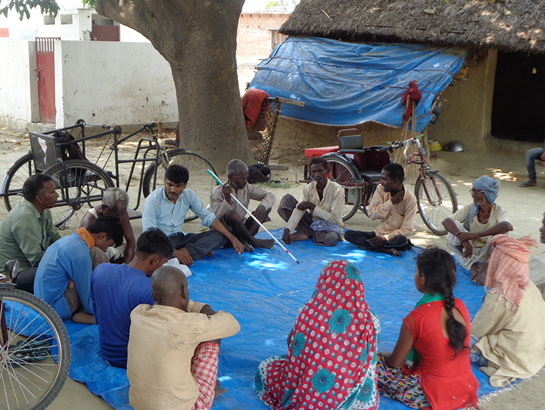Sadhu Saran is a resident of Unaula Awwal village, in Gorakhpur district of India. Living with a locomotor disability, he manages a general store next to the government-run junior primary school in the village. He is one of 427 people with disabilities (PWDs) who are members of the Community Based Rehabilitation programme of the Sustainable Human Development Association (SHDA).
Saran is also a successful biofortified zinc wheat farmer, which has enabled him to earn a decent living and provide for his family. He collects seeds of the HarvestPlus-promoted zinc wheat variety BHU 25 every season from SHDA, and he and his family members work hard at their farm.
SHDA is a well-established nonprofit organization based in Gorakhpur district, which is in the eastern part of Uttar Pradesh State. SHDA implements several livelihood programs with support from both public and private organizations, for small farming households in the surrounding areas.
As an implementing partner in the project, HarvestPlus India is collaborating with SHDA to undertake biofortified zinc wheat production and distribution, in 20 village councils of the Pipraich block of Gorakhpur district.
The current beneficiaries of the project are the 427 individuals, including 156 women and 271 men with 14 different types of disabilities. The production of zinc-enriched BHU 25, developed by Banaras Hindu University and promoted by HarvestPlus India and partners, has opened up multiple livelihood options for PWDs and helped them become independent and find sustainable livelihoods for themselves and their families.
PWD group supplies zinc wheat for school meals
Within the project, Saran joined other beneficiaries in his local area to form a smaller group known as the Jagriti Aajeevika. Together they have been actively involved in the production of BHU-25. In addition to saving up the wheat for their personal consumption, this group has been supplying about half their annual output to the local government primary school for the past three years. The school uses this zinc wheat atta (flour) to make rotis (Indian flatbread) and distribute it to students as part of the government-led midday meal program.
“Children enjoy eating these rotis for lunch. We’ve noticed the children in the village have less diarrhea and women feel their overall health has improved,” said Saran.
Inadequate zinc intake can have serious health consequences, including susceptibility to illness and infection across the life course. Eating adequate zinc helps strengthen the human immune system and supports many other important metabolic functions.
According to the UNICEF-WHO-World Bank Joint Child Malnutrition Estimates 2020 edition, 34 percent of Indian children under the age of five suffer from stunting. Zinc deficiency contributes to stunting as well as loss of appetite, lowered immunity, and increased risk of diarrheal disease and respiratory infections.
“HarvestPlus’ intervention in this project has not only led to the empowerment of the families of PWDs but has also created job opportunities for the youth,” said B.M. Tripathi, the Director and project coordinator of SHDA. “With increased yields, youth are exploring opportunities to open and run flour processing centers in the village. With improved nutritional security and a source of livelihood, members of this group have also been able to take up turmeric processing and seasonal vegetable cultivation in the off-season. This brings extra income to the families which they invest in health and education in addition to dietary diversity into the homes of these communities.”
Zinc wheat is currently grown by about 442,000 farming households in India overall, with an estimated 2.1 million household members benefiting.
HarvestPlus works in India to breed, test, release and commercialize biofortified iron pearl millet and zinc wheat through partnerships with the Indian Council for Agricultural Research (ICAR), State Agricultural Universities (SAUs), the International Crops Research Institute for the Semi-Arid Tropics (ICRISAT), the International Maize and Wheat Improvement Center (CIMMYT), seed companies, and community organizations.
Binu Cherian, the Country Manager for HarvestPlus, said: “Nutrition remains at the limelight in the COVID-19 pandemic crisis. Biofortified crops have the potential to provide access to nutrition to local communities through the food that they grow and eat on a daily basis, without additional cost.”
